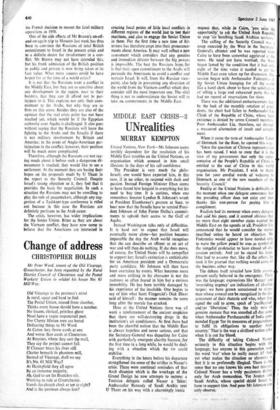UNrealities
MIDDLE EAST CRISIS-3 MURRAY KEMPTON
United Nations, New York—Mr Johnson seems terribly dependent for the resolution of his Middle East troubles on the United Nations, an organisation which aroused in him small illusions in the days of his self-confidence.
The President is very much the philo- Israeli; one would have expected him, in this case, if in no other, to respond with dash and passion. Instead Foreign Minister Eban seems to have found him languid in everything but his need to buy time. It is curious, when one remembers Senator Lyndon B. Johnson's wrath at President Eisenhower's posture at Suez, to hear now that the Israelis have to remind Presi- dent Johnson of John Foster Dulles's commit- ments to uphold their access to the Gulf of Aqaba.
Instead Washington talks only of difficulties. It is hard not to expect that Israel will eventually move alone—her position becomes impossible the day the Arab world recognises that she can describe an affront as an act of war and will then do nothing. If she does move, of course, the United States will be compelled to support her; Israel's extinction is unthinkable for an American president and a Democratic party candidate. Mr Johnson will then have been overtaken by events. What becomes more and more striking in his character is not the rashness so often feared in him but a carious immobility. He has been terribly damaged by his experience of the insoluble. One begins to say of him what Scott Fitzgerald's Dick Diver said of himself : the manner remains the same long after the morale has cracked.
Here at the United Nations there was all week a reinforcement of the ancient suspicion that there are will-destroying drugs in the institution's air conditioners. At first there had been the cheerful notion that the Middle East is always hopeless and never serious, and that the Secretary-General was departing for Cairo with particularly emergent alacrity because, for the first time in a long while, he would be deal- ing with a situation which the UN could stabilise.
Everything in the hours before his departure strengthened the sense of the artifice in Nasser's crisis. There were continual reminders of that Arab disunion which is the wreckage of the Grand Design he now attempts to restore; a Tunisian delegate called Nasser a faker; Ambassador Baroody of Saudi Arabia sent U Thant on his way with a charmingly ironic request that, while in Cairo, 'you seize the opportunity!, to ask the United Arab Republic to stop 'air bombing Saudi Arabian territory.'
The calling of the Security Council was'
a
coup executed %by. the West in the Secretary- General's absence and be was reported from Cairo to have been somewhat aggrieved at the news. He need' not have worried; the West began lamed by the condition that it had only eight of the nine votes it needed to get the Middle East even taken up for discussion. The session began with Ambassador Federenko of the Soviet Union lounging for all the world like a hotel clerk about to have the satisfaction of telling a large and exhausted party that he had no record of reservations for them.
There was the additional embarrassment that, by the luck of the monthly rotation of presi- dents, the chair had fallen to Ambassador Liu Chieb of the Republic of China, whose legal existence is denied by seven Council members. Poor Ambassador Liu, therefore, sat through a measured alternation of insult and compli- ment.
When it came the turn of Ambassador Tabor of Denmark for the floor, he opened this way: `Since the question of Chinese representation has been raised, I wish to state that it is the view of my government that only the repre- sentative of the People's Republic of China is entitled to the seat of China in this world organisation. Mr President, I wish to thank you for your cordial words of welcome to Denmark as one of the new members of the Security Council.'
Reality at the United Nations is definable in the moment when one delegate announces that
the presiding officer does not exist and then thanks this non-person for paying him a compliment.
Realism had its moment when every delegate had said his piece, and it seemed obvious that
no more than eight member states wanted the Middle East on the agenda at all. President Liu announced that he would consider the matter inscribed unless he heard an objection. Mr Federenko would appear to have needed only to wave the yellow pencil he uses as symbol of the vengeful proletariat to have closed off dis- cussion entirely. And yet he stayed his hand. One had to assume that, like all the others, he took it for granted that nothing would come of the business either way.
The debate itself revealed how little anyone present really believed in the emergency. There was the language; expressions like 'danger' and 'overriding urgency' are indications of absolute torpor; we have grown accustomed to states- men whose arousal can be recognised in the dis- armament of their rhetoric and who, when they signal the call to arms, speak of 'pacification and/or 'liberation.' Thus, the only note of genuine menace that was sounded all day came when Ambassador Parshasarathi of India com- mended Egypt 'for its measures of preparedness to fulfil its obligations to another Arab country.' That is the way a civilised nation talks when it is out for blood.
The difficulty of taking Colonel Nasser seriously in this situation begins with his language; has anyone in this generation used the word 'war' when he really meant it? And yet what makes the situation so alarming i' that it is so profoundly illogical There is the sense that no one knows his own best interec'. Colonel Nasser has a truly passionate dislike only for Arab monarchies. Yet Jordan and Saudi Arabia, whose special shield Israel have to support him. And poor Mr Johnson can only observe.


































 Previous page
Previous page